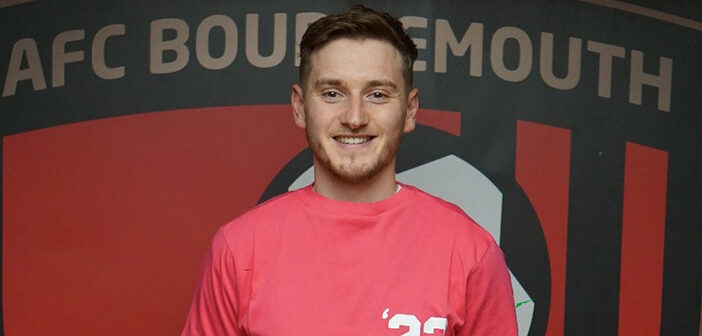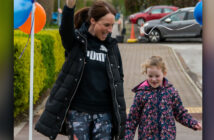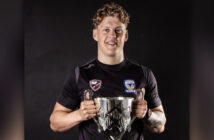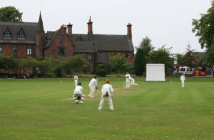WARRINGTON born David Brooks has pledged his support for Race for Life after making his comeback from cancer to football’s top-flight.
After 18 months of treatment, recovery and training, the 25-year-old AFC Bournemouth and Welsh midfielder has reclaimed his spot in The Cherries’ squad and has spoken in-depth about his Hodgkin lymphoma diagnosis for the first time.
David said: “Football was my life for 24 years before I was diagnosed and for a brief moment, in the grand scheme of things, football didn’t matter. It was about my health and my mentality.
“But to be able to play football again is a real blessing and I hope people will take part in Race for Life to support the kind of research that helped to get me back on the pitch.”
The former Sheffield United star knows exactly how vital it is to raise funds for life-saving research. That’s why he’s supporting Race for Life. Money raised at the event enables scientists to find new ways to prevent, diagnose and treat cancer -helping to save more lives.
Cancer Research UK’s Race for Life, in partnership with headline sponsor Standard Life, part of Phoenix Group, is an inspiring series of 3k, 5k, 10k, Pretty Muddy and Pretty Muddy Kids events which raise millions of pounds every year to help beat cancer by funding crucial research.
This is the 30th year of Race for Life and participants will receive an exclusive medal to mark the milestone.
Anyone who joins before Sunday April 30 can claim 30 per cent off the entry fee* as part of a special sale by using the code SPRING30.
Having scored against Croatia, Man City and Chelsea, David had been dubbed one of the brightest talents in the Premier League before he began to experience symptoms that would lead to a cancer diagnosis at the age of 24.
David said: “I remember at the Euros in the summer of 2021, I wasn’t starting or playing and despite eating three or four meals a day I wasn’t putting on any weight.
“Then I found I just couldn’t get my legs to take me where they needed to go. It was really frustrating because at that point, I didn’t know there was anything wrong.
“I went away to play with Wales and they do a medical check at the start of international duty and I explained to the doctor that I’d been struggling to sleep and had experienced some night sweats as well as a sudden drop in weight.
“Twenty minutes later he came to my room and said, ‘I don’t want to alarm you but everything you have described to me is a symptom of cancer.’
“It was a big one to try to digest and knowing you had to ring your mum and dad and tell them something so big when you still didn’t know for sure yourself, meant it was a very tough couple of hours.
“I went for a blood test that evening and had more tests the following day and within 24 hours I was back in London having a biopsy. We were yet to receive confirmation but the doctor told me that it did look like it was cancer and that I needed to prepare myself for that news.
“You almost don’t want to believe it. When you hear the word ‘cancer’ as a young lad you don’t expect yourself to be in that position where you need to know everything about it, unless you’ve had a relative that has gone through that process.
“The worst pops into your head because as soon as you hear the word ‘cancer’ you don’t think it can be positive in anyway and you look at the bad side of it. It was a difficult one to try to process.
“I’m not in touch with my emotions on a day-to-day basis but when a cancer diagnosis comes into play, it’s just very different. It’s difficult to stay composed in that situation but I never really let it out until I was on my own.
“I didn’t want a fuss and just let everyone do what they needed to do, then when I was on my own, I had a bit of a cry and hoped everything was going to be alright.
“I was diagnosed with stage 2 Hodgkin lymphoma and the prognosis was a positive one. I was told I would be given six months of chemotherapy and would hopefully be ok after that.
“You have to be prepared that you might not get good news at the end of that period and deal with it as it lies, but I had to have it my head that it was six months of chemo and then just try to get back to playing football.
“I had chemo once every two weeks and for three or four hours, I’d be attached to a drip which would pump the drugs in to kill the cancer cells.
“The treatment was slightly misleading to start with because the first one wasn’t as terrible as I had feared and I thought it wouldn’t be too bad. But it hit home on the second and third and progressively got worse over time.
“I’d have the chemo, feel horrendous for a week, start to feel a bit better, then as soon as you start to feel well enough to leave the house, you have to go back and do it all again. It was a very different type of life to what I’m used to.
“My girlfriend used to come to every chemo and I remember just trying to fall asleep so I wouldn’t be sick. I didn’t want to be ill so I’d have all the anti-sickness and drowsiness pills to help me deal with it.
“My girlfriend was amazing. No-one wants to find themselves in that situation and she’s probably seen the worst of me with all the side effects of chemo, but I can’t speak highly enough of her.”
As David’s treatment came to an end, despite previously clocking up around 11km over a 90-minute match, David found it impossible to walk up the stairs without becoming breathless. His weight surged from a low 65kg to 85kg as a result of his prescribed steroids and the difficulties he had faced staying active during his six months of chemo.
David said: “I’d lost every bit of muscle and put on more than 15kg of weight so I needed to get that off me and put muscle on before I could even think about stepping on a football pitch again.”
But then came the news that David had achieved the biggest goal of his life. On the day Bournemouth secured promotion back to the Premier League, David announced to his fans that his treatment had been successful and he was cancer free.
He was met with a standing ovation from the crowd and was ready to face another challenge – to get himself fit enough for football’s top flight.
David said: “There were a few tears in the house when they told me. I was just over the moon that it had worked and I didn’t have to go through it any more.
“When we were promoted, I celebrated for 10-15 mins and had to go and sit down because I was completely out of breath. It was a reality check.
“Then when I went back to work, I just really enjoyed being back in the changing room again never mind playing a Premier League game.
“I never doubted that I would keep trying but when I had done three months of hard work and was close to getting back into a match day squad, I played in an under 23s game and my hamstring popped.
“I’d never experienced a muscle injury before and that was probably a different type of knockdown because it dawned on me that my body might not be the same after treatment. The thought that I might not be able to do what I dreamt of all my life was a difficult thought.
“But I never stopped trying and thankfully my body managed to pull together to get me back. Now I just want to be as fit as possible whenever I’m called upon and that’s all part of the process. Just get as fit as I can and play as many games as possible.”
Cancer Research UK’s North West spokesperson, Jane Bullock, said: “We are delighted to see that David has made a full recovery from Hodgkin lymphoma and has been able to return to the sport and club that he loves.
“We are grateful for his support for Race for Life and would love for as many people as possible to join us during our 30th year. Sadly, cancer affects all of us in some way.
“We want to make sure that everyone can join the Race for Life movement. Our participants come from different backgrounds, with different stories, but with one thing in common – the determination to help beat cancer. Whether people are living with cancer, taking part in honour of or in memory of a loved one with cancer, or signing up to protect their own children’s future, everyone has a reason to Race for Life.
“We’ve seen survival rates in the UK double in the last forty years thanks to the tireless efforts of researchers, but this can only happen with the continued support of fundraisers up and down the country.
“Together we can bring about a future free from the fear of cancer. So we’re asking people: Who will you Race for?”
Every year around 43,600 people get diagnosed with cancer in the North West. And one in two people in the UK born after 1960 will get cancer in their lifetime.***
The first Race for Life event was held in Battersea, London in 1994, where 750 participants raised £48,000. It was so successful that the following year, the race was extended to six venues across the UK. Today around 450 Race for Life events are held every year and since it began more than £940m has been raised to fund life-saving research. Race for Life is today open to everyone, no matter their fitness level, background or gender.
Race for Life events will be held at Warrington’s Victoria Park on Sunday June 11.
Cancer Research UK’s Race for Life, in partnership with headline sponsor Standard Life, part of Phoenix Group, raises funds for world-class research to help beat 200 types of cancer – including bowel cancer, breast cancer, prostate cancer, lung cancer, testicular cancer, brain cancer, children’s cancers and leukaemia.
Chief executive of Standard Life, part of Phoenix Group, Andy Curran, said: “We are extremely proud to have been chosen as the headline sponsor of Cancer Research UK’s Race for Life. This sponsorship will help encourage participation and raise funds for life-saving research to help beat cancer.”
To enter, visit raceforlife.org




